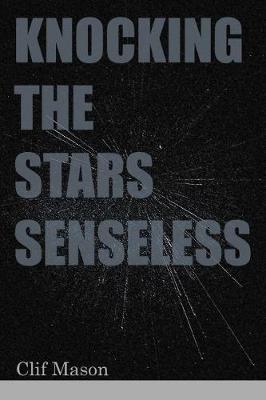Clif Mason and I met at a poetry workshop, not quite a decade ago, and he was an excellent poet then. An English professor and Dean of Humanities, he is gentle, soft-spoken and rounded out by insight. This is a man who writes poems whose speaker stands before a stuffed otter in a museum and mourns its passing (see “The Otter”).
 What poems was he workshopping? If you have Knocking the Stars Senseless in your hands, then you have some of them. I have the sense that he’d been working on these poems long before we saw them. He kept working on them after they were published.
What poems was he workshopping? If you have Knocking the Stars Senseless in your hands, then you have some of them. I have the sense that he’d been working on these poems long before we saw them. He kept working on them after they were published.
So when I read people being amazed at Clif Mason’s suddenly being “prolific” because he has had three different poetry books released from three different presses within a year, I feel his pain. He has been agonizing over these for perhaps more than a decade—a handful maybe twice that. So prolific? No.
He wasn’t just adding and removing commas, either. Merciless as Ming, he’d quarter poems to stubs or stretch them on the rack beyond their original form. They’d appear in form, aligned as a stone army, and be stripped out of uniform to throw them into cubist arrays. He was tireless in his revisions.
I review books—of friends, strangers and people who chose to be enemies—as subjectively as possible. There are nigh glowing reviews here of people sharpened themselves into daggers and sweet dismissals of candied personalities. I try to review as if I’m friends with the reviewee and the people looking for good books to read. As a matchmaker, I don’t want to let either down.
Moreover, Mason’s voice is a new voice that needs to be heard. Have you devoured the sounds of Ocean Vuong’s words? Does your heart quicken at the submerged wisdom and surreal images carved by W. S. Merwin? Then savor Clif Mason because their sauces flavor his volume’s stew. Until I read the other two volumes, I’m not yet willing to concede that he is a major writer—he may be, but time will have to decide that, anyway. I will say that his voice (not to mention this volume in particular) is one that needs to be reckoned with.
To get a sense of the book’s trajectory, peer into the opening prose poem, “Double Narrative: This Waking Life”:
When I yearned for the incense of candle & canticle, I sought the fulcrum of trance & tragedy, hawk & hook.
The book I wrote unwrote itself as I typed. Characters disappeared as if kidnapped.
This is both true in his personal life and in the larger world. The personal, literal truth is how, as I mentioned earlier, the book has gone through its own radical changes, but in the larger sense Mason laments violence—such as Sandy Hook and Auschwitz—where people did “disappear,” lives brutally brought to an end. He writes in “Day of the Dead”: “Have you found the trunk of moldering toes? // This is the age of amputation // We learn to live with less & still less.”
“This Waking Life” from the title has its own double hook. “Waking” suggests that we are awake, but also that we are still asleep, in need of being roused—a perpetual state.
In “Nightwalk in the Republic” the poem is more or less a palindrome of lines—the same forward as backwards, except for tiny alterations you have to pay close attention to. The speaker fears sleep as the news of another mass shooting torments his dreams—a perfect scenario for this poetic form. The opening/closing change are perhaps the most potent. It opens (I had to stop myself from quoting more—just one thing, you said):
Owl calls on a cold night—
solemn, commanding hoots.
I wander, lost, full of midnight’s wanderlust
and closes:
as I wander, lost, full of midnight’s wanderlust
& command solemn hoots
from the owl calling on a cold night.
Note the owl, in the first instance, lacks an article (a, an or the), which makes it more mythic—a name, perhaps—the owl of all owls, the god of owls, the original progenitor. The owl could be a symbol of wisdom or of its power, its predatory nature. Perhaps both.
(All of the above do seem to apply. The poem “Insomnia” confirms and further sketches the owl’s nature: “Night is the owl’s kingdom....//The owl rules the world of shadow & hazard.”)
The owl “calls on” which could be a simple sound, or it could be visiting or asking help from the cold night. The commanding hoots helps determine its powerful intentions, hinting at a supernatural nature that gets the night to do its bidding.
When we return to these images, the speaker now commands. He is no longer powerless, but his powerlessness, his lostness, his lust for midnight’s wandering have become a kind of power as he demands the owl to call. Given the voice, we assume he can do this in this transformation although one is free to question that ability. We would have two very different poems, depending on which one chooses.
Strangely, both do seem to apply to the situation. This duality applies to the opening poem (seen above, such as the “candle & canticle, fulcrum of trance & tragedy, hawk & hook”) and throughout the book. The poet sings in a beautiful melancholy voice as he raises a candle to shed light on our place in the world. It is a fine balancing act since it calls on beauty to enlighten our tragedies.

No comments:
Post a Comment